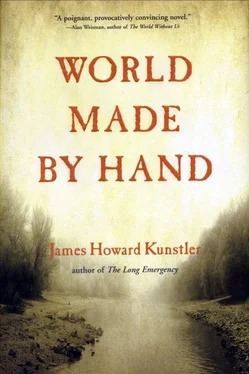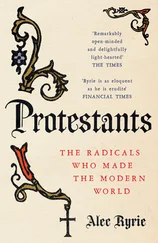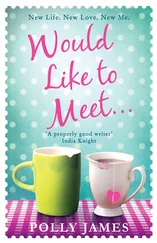The blister on my burned left hand had broken open from helping to dig the Raynors’ grave. I was concerned that it might get infected. You couldn’t be too careful about infected wounds when there were no more antibiotic medicines. I asked Minor for some whiskey I could apply as disinfectant. He asked to see it. I held my hand out to him. He studied it a while, told me to wait right there, and bustled off into the woods. He returned in a minute with several stems of some kind of leafy weed.
“What’s that?”
“Solomon’s seal,” he said. “This here might seem uncouth, but it’s necessary.”
He picked off one leaf after another from the stems and put them in his mouth until he was masticating a great chaw of them. Meanwhile, he took a bandana out of his pocket. By and by, he extracted the wad of chewed leaves from his mouth and laid them on the bandana.
“Give me your hand.”
I did. He arranged it so the chaw was over my blister and then rather tenderly tied the bandana around my hand.
“You keep it like so the rest of the day and overnight,” he said. “That burn blister’ll be healed up in the morning.”
He stated this with complete assurance. I didn’t want to act contrary about it or seem ungrateful so I agreed.
Our fishermen came back in surprisingly short order with more than enough good-sized fish for our lunch: several largemouth bass and a northern pike the size of a Yule log. We were hungry after all that digging.
There had been a lot less angling in the Hudson River in recent years as epidemics drove down our numbers and motorboats stopped running, and there was no more factory-made tackle. Less pollution of all kinds ran into the river, no more factory fertilizers and pest control poisons, no more detergents. So the fish had returned in numbers not seen in anyone’s memory. Land-based game, on the other hand, was noticeably sparser now, as nobody observed hunting seasons anymore. The deer, especially, were down, even though commercial grade ammunition had also gotten scarce. People jacked deer all year round, by any means possible, including pitfalls, deadfalls, and traps. Rabbits were down because nobody cut lawns anymore and the grassy margins they thrived in were returning to woods. Coyotes were up in tandem with sheep and goats. Ben Deaver swore he saw a mountain lion on the roof of his chicken shed one morning the previous September, and further north of us, in Hebron, where the human population was back to the pioneer level of the mid-1700s, a “catamount” reputedly killed a four-year-old boy inside a house.
Minor butchered the fish expertly with his short knife. His grandfather ran a catfish farm in South Carolina when he was little, he said. He could cut fillets all day long and into the dark.
“How do you stop a fish from smelling?” he asked and before anyone could come up with a quip, he said. “Cut off its nose.”
He dipped the bass fillets in cornmeal and fried them in last night’s bacon grease, which he had saved in a can.
“What has big sharp little teeth, a tail, scales, and a trunk?” he asked and immediately answered. “Pikey fish going on vacation. Y’all are slow. Maybe retarded.”
The pike he just gutted and roasted whole on crisscrossed green sticks. The New Faith boys all brought jars of their own pickled peppers and onion relish. It did make everything taste interesting when salt and pepper were scarce.
Elam had discovered a thicket of raspberries growing up along the roadside and we filled our hats with them as Minor cooked off the fish. We packed up directly after this lunch and resumed walking our horses toward the city, as well fed as if we had been home.
The afternoon weather resolved into an uncomfortable drizzle, driven by hot winds out of the south. I had an old ripstop nylon poncho from my collegiate camping days, but it had lost its waterproofing. We began to enter what had been the suburbs emanating out of the capital city, Albany, and its neighbor, Troy, and a handful of other industrial towns in and around the confluence of the Mohawk and Hudson rivers. We planned to cross the Mohawk at Waterford on the railroad bridge there.
Waterford began its existence as the gateway to the Erie Canal system, the first stretch of which was built to bypass several waterfalls on the Mohawk River. But the locks there no longer functioned because they were rebuilt and enlarged in the early twentieth century to open and close on electric power. Now there was no way to operate them. They were too big for human or animal power.
We began to encounter more people now, inhabiting the ruined suburbs, the lawns replaced by potato patches, the split-levels and raised ranches turned into hovels now that the electric amenities and the plumbing were out of order, including the wells and toilets. Ill-clad, scrawny children played in mud puddles in the broken streets and stopped to blink at us as we passed on our horses. When Brother Minor offered up one of his jokes, they just gaped. By and by, we crossed an old commercial highway strip with its complement of dead gigantic discount stores, strip malls, and defunct burger barns. The buildings were all in various stages of disassembly as materials of value were stripped from themcopper pipes and wires, aluminum sashes, windowpanes, steel girders, and cement blocks. The parking lots seemed especially desolate with nothing in them but mulleins and sumacs poking through the cracked pavements.
At Waterford, the bridge connected two bluffs about a hundred feet above the surface of the Mohawk River. It was one of those engineering marvels from the early twentieth century that could never be replaced now, any more than the Coliseum in Rome could be rebuilt by the most talented subjects of Frederick Barbarossa. Near the northern approach to the bridge, we came upon a man beating his donkey with a long-handled whip. The donkey was hitched to a cart full of bricks and made a terrible racket with each blow. The man, a hulking, well-fed brute, wore a pair of homespun pants tucked into crude ankle boots and a chewed up straw hat that was little more than crown. His belt was a rope. Shirtless in the drizzle, his wet muscles bulged as he laid into the donkey, which was as starved-looking as the man was stout. The donkey already had several bleeding stripes on his back.
“That ain’t right,” Brother Minor said as we came upon the scene. Minor rode up to the man. The rest of us hung back.
“Afternoon,” Minor said.
“What do you want?” the man said, drawing back his whip hand as if not to miss a stroke.
“You ever hear this one?” Minor said to him. “There’s this here zebra lived her whole life at the zoo, and the kindly old zookeeper decided to put her out to pasture on a farm in her last years.”
“What the hell—” the man said.
“Just listen up, you’ll like this.”
“You get the hell out of my sight,” the man said to Minor and turned to lay on his stroke. The donkey cried out as the lash fell.
“So, this here zebra was so excited,” Minor said, without skipping a beat, “when she got onto that farm and was amongst all these strange new animals. And she come up on this big fat brown and white critter. `Hey thar, I’m a zebra, what’re you?’ `I’m a cow,’ it says. `That so? What do you do?’ the zebra asks. `I make milk,’ the cow says-
“I’m warning you,” the man with the whip said.
“So what do you know?” Minor said. “Next this fluffy white ball of feathers steps by. What’re you?’ the zebra asks. Why, I am a chicken and I lay eggs,’ it says. So next, what do you know, the zebra sees an animal that looks exactly like her only without no stripes, and the zebra asks, What’re you-?"’
“Didn’t you hear me,” the stout man with the whip said.
Читать дальше












